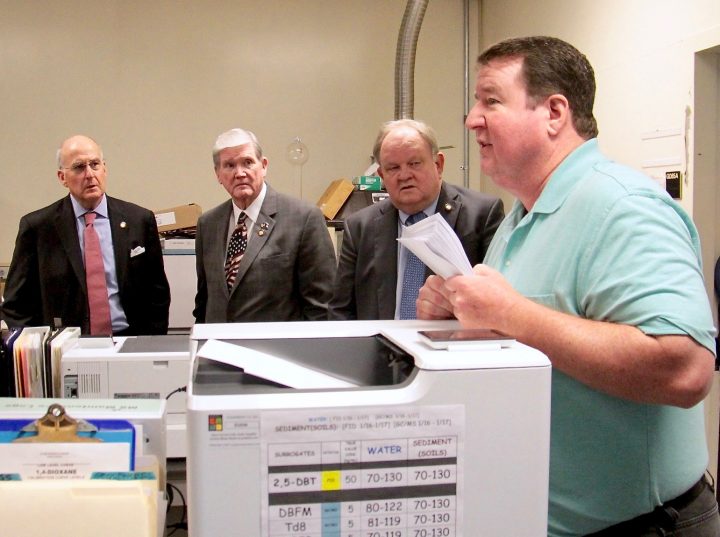
This report has been updated to include a statement from Chemours.
RALEIGH – After a late-March legislative tour of the Department of Environmental Quality Reedy Creek laboratories, DEQ Secretary Michael Regan was clear that action over air emissions at the Chemours Co. plant in Bladen County was coming.
Supporter Spotlight
Regan said DEQ was working methodically to make as solid a case as possible. “We are building a case to take the necessary next steps to prevent Genx from entering the atmosphere and contribute to an ongoing violation of well water,” he said in an interview after the tour.
“We’ll do what we’ll need to do, and the company will do what it needs to do.”
Michael Regan, DEQ Secretary
Regan, a specialist in air quality when he was an Environmental Protection Agency administrator, said the department would seek to shut down emissions of GenX, even if the result is a decision by the company to close the plant.
“We’ll do what we’ll need to do, and the company will do what it needs to do,” he said.
This month, in a series of enforcement actions, DEQ began to lay out that case, starting with actions that are likely to result in the shutdown of all GenX emissions.
Last Friday, the state’s Division of Air Quality gave Delaware-based Chemours notice that is has three weeks to prove that it can reduce emissions to “a level that will stop contributing to groundwater violations” or the company will no longer be permitted to discharge GenX emissions. On Monday, DEQ amended a previous complaint filed in Bladen County Superior Court asking for a preliminary injunction against Chemours. The move followed an announcement by DEQ that estimates of annual GenX emissions were 40 times higher than originally reported by the company and four times higher than a revised estimate last fall.
Supporter Spotlight
Alvenia Scarborough, senior director of corporate communications for Chemours, said in a statement the company continues to work with DEQ on reducing emissions and addressing groundwater concerns.
“Our team in Fayetteville, NC is working diligently with the DEQ to respond to inquiries in a timely manner and implement solutions to further reduce our emissions. Since the summer of 2017, Chemours has proactively taken numerous steps to reduce emissions, including air emission, of C3 Dimer Acid (also known as Gen-X) and other per- and poly-fluoroalkyl substances known as PFAS compounds from Fayetteville Works,” Scarborough wrote in a response to Coastal Review Online. “We are also developing comprehensive remediation plans to address groundwater concerns. Working under the oversight of the NCDEQ, we are taking swift action to ensure that current and future operations are protective of people and the environment.”
The latest action on DEQ’s GenX investigation confirms Regan’s recent assertions that the department is getting a handle on the sources of contamination around the Chemours facility.
He said in community meetings he’s attended on the coast that upriver residents appreciate the work to stop GenX discharges, but remain worried about the bigger picture.
“There is a frustration with the lack of understanding and knowledge of the long-term impacts of GenX,” he said.
For the department, getting at those questions and how to handle the health risks of emerging contaminants could prove far more difficult than shutting off GenX from the stacks at Chemours.
Since the initial public reports of the presence of GenX in treated drinking water drawn from the Cape Fear River last summer, scientists and policy makers have stressed that the issue of emerging compounds is far broader than GenX and by no means isolated to the lower Cape Fear basin.
No Agreement
Last August, despite criticism that the issue called for a statewide approach, legislators approved an initial round of funding for studies and testing by University of North Carolina Wilmington and the Cape Fear Public Utility Authority.
Since then, lawmakers have failed to reach agreement on a new, broader approach, in part over lingering disagreements between House and Senate leaders over funding for DEQ and Department of Health and Human Services.
This year, disagreement over a request for additional DEQ and DHHS funding for additional equipment, led to competing House and Senate versions of a bill to pay for a new mass spectrometer and additional personnel, but no agreement.
That legislation, or its replacement, is likely to re-emerge in this year’s short session, which starts May 16.
Cooper Seeks Staffing at DEQ
On Tuesday, Gov. Roy Cooper released a piece of his budget proposal for the short session aimed at addressing testing and regulation of emerging contaminates.

Cooper’s plan calls for $14.5 million for DEQ and DHHS, including $7 million for 39 new employees to conduct surface water, aquifer and groundwater sampling focusing on perflurorinated compounds and work for DAQ to conduct rainwater analysis.
Cooper said some of the work of the new employees would also be directed to help the department clear a lingering backlog of pollution discharge permits.
The proposal also asks for $1 million in additional equipment, $1.5 million for upgrades at DEQ’s Reedy Creek laboratories, $4.4 million for digitization and upgrades to the industrial permitting process and $535,000 for additional toxicology and epidemiology experts at DHHS.
Cooper’s proposal is a jump from his initial $2.3 million proposal announced last year in Wilmington. DEQ officials have pointed to other states that are setting up similar programs. Michigan recently passed a $22 million plan for emerging contaminants.
Regan said DEQ has a strategy for how to deal with emerging contaminants but needs to have the funding and equipment in place to make it work.
“This is not about growing government,” he said, “this is about bringing our capabilities into the 21st century so that we that can protect public health, but so that we can also keep pace with a growing economy. A growing economy brings new businesses, new processes, so we need to be able to keep pace for that.”
‘A Process in Place’
Regan said DEQ and EPA officials are working together to determine which among the 88,000 unregulated, emerging compounds are of most concern to North Carolina, and then to prioritize them and ultimately determine safe levels based on health data and health goals. That, he said, will give regulators “a floor, a foundation” to work with.
“We have a process in place for setting standards,” he said. “What we’re grappling with is the lack of data for these new emerging chemical compounds.”
Regan said he appreciates the House’s efforts and has been reaching out to individual senators to make the case ahead of the short session.
“We’re asking for resources, both technological resources but also new positions to create new programs that can receive this information and responsibly set standards one by one based on priority.”
“Try to see if we can work something out that I can bring to committee and say this is something that the House and the Senate can agree on.”
Rep. Ted Davis
The budget request by the administration comes as House and Senate negotiators are working behind the scenes to avoid another stalemate on funding.
Rep. Ted Davis, R-New Hanover, who chairs the House Committee on North Carolina River Quality, told committee members last month that he is working with Sen. Michael Lee, R-New Hanover, to resolve differences ahead of time.
River Quality committees were set up in both the House and Senate last year. The House committee, which has met each month through the interim, is serving as the main conduit for legislation related to GenX and emerging contaminants. The Senate committee has met only once, and Lee has been working as the Senate’s point person on legislation.
Davis said he and Lee are meeting ahead of the session to go over ideas for legislation. The idea is “don’t try to get the cart before the horse,” Davis told committee members. “Instead, try to see if we can work something out that I can bring to committee and say this is something that the House and the Senate can agree on.”
Rep. Chuck McGrady, R-Henderson, a member of the River Quality Committee and one of the main appropriations chair in the House said given the compressed time frame of the short session, working it out ahead of time is essential.
“I think that’s the process we need to have if we’re going pass something,” McGrady said.
Supporters of a new attempt could have an easier time at least in terms of procedure, than trying to win over a majority in a special session like the one earlier this year.
Since any new legislation or a modified version of House Bill 189, the Water Safety Act that stalled in February, would be considered during a regular session, the funding portion of the bill, and possibly the policy provisions, would likely be folded into the overall budget adjustment act.







